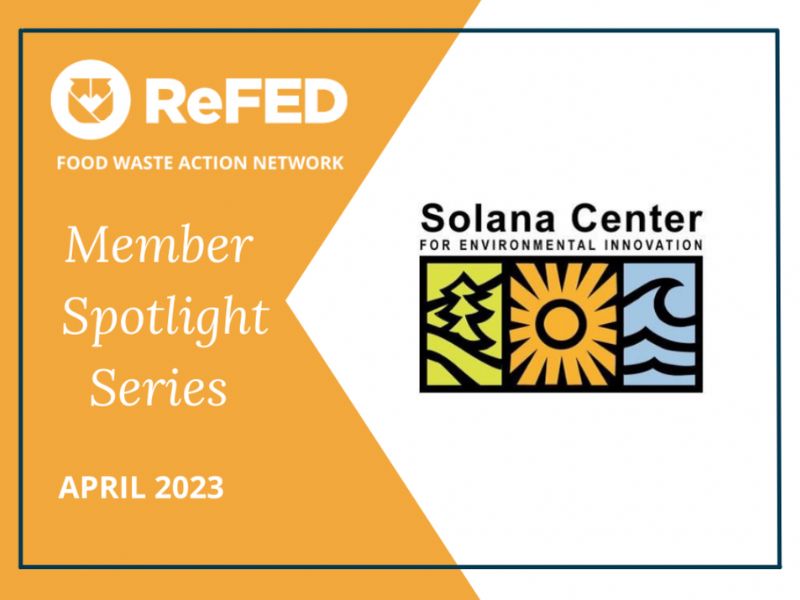ReFED Food Waste Action Network Member Spotlight

Solana Center is excited to be featured as a Member of ReFED’s Food Waste Action Network (FWAN). The following interview was originally published on their website in April 2023 here.
Organization Overview:
Solana Center for Environmental Innovation helps individuals, businesses, and municipalities implement practical solutions for food waste diversion, surplus edible food donation, and environmental sustainability improvements. We provide education, outreach, and consulting services throughout the food chain – from food waste prevention to composting expertise. Solana Center has a successful history driving regional efforts, resulting in changes to behaviors and municipal code that promote sustainable and adoptable surplus food management practices.
Can you talk about some notable impacts you’ve made to date pertaining to food waste reduction and GHG emissions reduction?
Solana Center leads systemic evolution impacting community food waste attitudes and policy by demonstrating accessible solutions with quantifiable benefits to waste reduction and diversion. We reach thousands of businesses, farms, and residents, improving their self-management of excess food through prevention, donation, and composting.
Our programming results in annual composting over 170 tons of food waste, preventing more than 200 MT CO2e of GHG emissions each year. Our first-of-its-kind food waste drop-off program, Food Cycle, yielded robust results tested over its six-year project life with 220 households – participating residents reduce food waste by more than 50%, generating a monthly average of 9.6 lbs./person as compared with 20 lbs.
Lessons from Food Cycle are replicable in other communities. By identifying the motivations and habits of Food Cycle participants, we can implement campaigns that lead to wider community adoption. Five times as many participants achieving only 10% reduction doubles the community impact. There is a motivation factor that unlocks this return with the wider community, and we aim to further capitalize on it.
What project(s) are you currently working on that you are particularly excited about and want to share with the Network?
Our proof-of-concept programs and field work with businesses influenced California regulations and San Diego regional ordinances involving food waste donation and disposal.
As the San Diego region only has the processing capacity to manage 12% of its 600,000 tons/year of food waste, other innovative and diversified solutions are needed.
For example, we conceived and implemented a model for returning commercial food waste to local agricultural lands for onsite composting, operationalized with a single food business and an individual farm. The six-month pilot resulted in 5x more nutrient-rich compost over commercial compost, 25x reduction in transport miles, $250 monthly hauling and disposal savings for the food business, 40 tons food waste diverted, and an estimated 30 MT CO2e avoided.
Currently, we seek to make this arrangement a widespread reality, demonstrating the benefits of regional closed loop food systems. San Diego is the place to create a functioning replicable model, with our year-round growing seasons as well as farms and businesses in near proximity.
Additionally, we are unlocking the enthusiasm and motivation for food waste reduction and proper contaminant-free separation found with our Food Cycle community composting program. With funding, we plan to partner with RIT’s Golisano Institute of Sustainability to learn from Food Cycle participants and scale the 50% reduction to a broader population.
How can FWAN members get involved with your organization?
As an impact-driven enterprise, we deliver programming for immediate impact, as well as innovation for long-term benefit. Funding is always necessary for an organization that keeps its feet on the ground and eyes on the horizon.
We welcome partnerships that help us pursue our mission and prove our ideas. Incubation-to-realization programming requires funding. We are on a journey to create impactful, practical outcomes, and we encourage fellow travelers – funders, collaborators, advisors, partners, champions, and implementers.
How can your organization help others accelerate our national goal to reduce food waste by 50% by 2030?
Solana Center for Environmental Innovation has already demonstrated 50% impact through our Food Cycle program. Scaling that program and other innovations is the next step.
Fifty percent is an incredible goal, and there will not be one answer, one community, one business that gets us there. This goal will be achieved in steps with a multitude of practices in the household, in the community, at the grocer, and on the farm. Our research and programming have wide impact, influencing individuals, businesses, and municipalities.
As a California-headquartered organization, we are heavily involved supporting state legislation to rescue edible food and divert waste from landfills. Our education and outreach materials targeting residential and commercial food generators are freely available, including video case studies, resource guides, and business inspection templates.
What trends in the food waste space are you seeing that you think will gain traction in the next five years?
We have witnessed a significant swing in mainstream awareness of the environmental and social damage caused by food waste. We expect to see this continue to increase nationwide. With greater awareness will come stepped-up legislation and investment. “Mispriced externalities” as relates to landfill tipping fees is mostly unexplored. Our own regional landfill “tipping fees” are half the cost of composting, meaning that it is less expensive to trash food waste than to compost it. The incentive structure is incongruent with the 50% food waste reduction goal. For full embrace of change, the economics must pencil out for businesses, cities, and households. We hope to see desired behavior incentivized by economics and markets.
What food waste resources would you like to share with the Network?
- Food Waste Prevention & Organics Recycling– Recovery and diversion resources for commercial food generators (Solana Center website)
- California Food Businesses Tackle Climate Law Compliance – Insights from food waste prevention programming with businesses (BioCycle article)
- To Reduce Food Waste, Investors and Community Organizations Need to be at the Table – Discussion of need for investment to achieve food waste reduction (co-authored blog with Closed Loop Partners)
- Solana Center for Environmental Innovation Impact Report – Compilation of the effects of our annual programming
